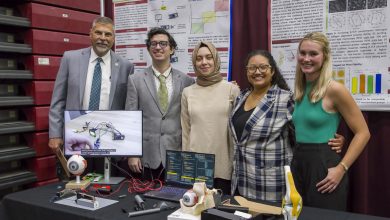Florida Tech Flight Research Ensuring New Safety Protocols
General aviation, the private transport and recreational flying component of aviation, has experienced increased fatalities in recent years. In November 2019, the National Transportation Safety Board reported a 13-percent increase in fatal civil aviation accidents in 2018, rising to 393 from 347 in 2017.
The aviation community has long worked on developing new certification standards and safety guidelines for those taking to the skies.
With the help of Florida Tech’s research, it appears those changes may soon take effect.
Under the leadership of Flight Test Engineering Chair Brian Kish and Associate Dean of Flight Operations Isaac Silver, the university’s latest project, “Advancing the Safety of Flight Through Flight Test Engineering and Accident Investigation,” has Florida Tech working with the Federal Aviation Administration (FAA) to create new compliance protocols that will help single-engine aircraft decrease loss-of-control accidents. Those involve the unintended departure of an aircraft from a controlled flight, a significant factor in many aviation accidents. The team also analyzed using angle-of-attack (AOA) warning and protection methods to prevent planes from stalling.
Florida Tech’s flight tests concluded that the means of compliance must evaluate three areas: the stall characteristics of the aircraft, the pre-stall handling qualities, and the effects of safety enhancements, such as AOA warning and limiting systems.
The three-year research project consisted of 30 flights, 52.1 hours of flight time, a Florida Tech student internship at the Technical University of Munich and the use of six single-engine aircraft (Diamond DA40, Piper PA28, Cessna 172, Mooney M20C, Cirrus SR20 and Quest Kodiak 100). The team studied stall characteristics of the six planes by getting them to stall and keeping them within the FAA’s plus/minus 15-degree test requirement. The research also looked at areas that cause stalling while the plane is close to the ground, such as during takeoff. Kish noted that depending on the flap configuration of some aircraft, the plane’s nose would go up 30 degrees without the pilot doing anything.
“We were able to figure out which airplanes had abrupt responses, what caused the responses, and how the FAA could put something in the certification methods to address this issue,” he said.
The other aspect of the flight research looked at safety measures through additional technology. Single-engine aircraft provide a much more stripped-down version of flying compared to their commercial counterparts, so the FAA wanted to see how protection systems using AOA displays along with audio commands would work to alert pilots on small aircraft. Haptic feedback was also researched through equipping the plane with an active stick that would vibrate to warn the pilot of an impending stall.
The collaboration with students from the Munich university and the University of the German Armed Forces provided a quick turnaround on technological changes to the plane.
“We’d fly in the morning, talk about it at lunch, the students would make a quick change, then we’d fly in the afternoon. It was awesome,” Kish said. “That’s a moment in time where you have the right people, the right enthusiasm and the right team, and you’re able to get things done.”
Florida Tech’s work with the FAA has provided students and researchers with flight test experience, while providing the federal agency with real-time data that could be used to create realistic means of compliance. Previous compliance methods, based on speculation and computer models rather than actual flight data, had been found to be too complex for pilots. According to Kish, the FAA’s European counterpart, the European Aviation Safety Agency, is also interested in Florida Tech’s findings.
“I think it’s kind of cool, that the results we’ve done through flight experiments are actually making a difference in the way future aircraft are certified, and actually providing a realistic alternative that industry is welcoming and asking for,” Kish said.
###





